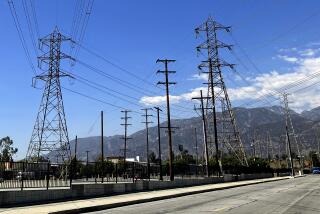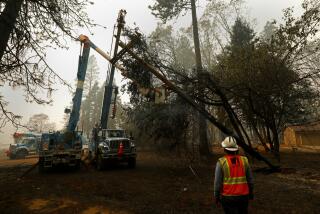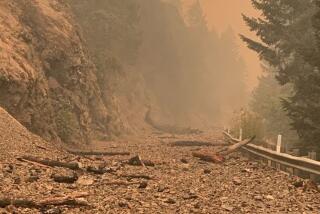California adds new rules for planned power shutoffs under laws signed by Newsom
Gov. Gavin Newsom signed legislation Wednesday to tighten the rules for utility power shutoffs as California grapples with more frequent planned outages when potentially dangerous wildfire conditions exist.
The new requirements call for investor-owned utilities to create plans to lessen the effects of outages on customers with sensitive medical needs and notify all emergency responders, healthcare providers and public safety groups within an outage area. The laws are among roughly two dozen bills related to wildfires that Newsom has signed into law this year.
“Given the realities of climate change and extreme weather events, the work is not done, but these bills represent important steps forward on prevention, community resilience and utility oversight,” Newsom said.
Conceived as a method of last resort, planned outages have become a more common tactic to prevent disaster following some of the deadliest and most destructive wildfires in state history. Electrical utilities rely on weather models to suggest when strong winds, hot temperatures and dry vegetation create prime conditions for power lines to be knocked down or crossed, sparking dangerous wildfires.
But turning off power creates public safety risks, and the practice has heightened concern for vulnerable residents, particularly the elderly or disabled who could be subjected to life-threatening hardship without electricity.
State regulators issued several rulings over the last year to require utilities to provide advance notice to customers and emergency responders when possible. But examples of botched notification and poor communication inspired lawmakers to craft bills this year that codify shutoff rules.
Senate Bill 167 from state Sen. Bill Dodd (D-Napa) requires investor-owned utilities to outline protocols in their annual wildfire mitigation plans that would lessen the effects of shutoffs on so-called medical baseline customers, or individuals with sensitive medical needs. Those customers qualify for discounted monthly rates if they use electricity to power life-sustaining medical equipment or motorized wheelchairs, or if they suffer from other qualifying medical issues. Utilities use the programs to identify customers who could be at harm if they lose power.
During shutoffs last year, Pacific Gas & Electric Co. provided extra outreach to medical baseline customers. But some local public health officials say thousands of vulnerable residents do not participate in those programs, which require customers to apply and qualify, and they could have been at risk without proper warnings.
Newsom also signed SB 560 by state Sen. Mike McGuire (D-Healdsburg), which seeks to improve communication surrounding shutoffs.
McGuire introduced the law this year in response to outrage in his community over limited warnings. He has repeatedly vented his own frustrations, saying he shouldn’t have to “legislate common sense.” The bill requires utilities to develop protocols to warn first responders, healthcare providers, telecommunications companies and other groups about power shutoffs.
Among other notable wildfires laws signed by Newsom, SB 247 allows a new division within the California Public Utilities Commission to hire an independent third party to audit a utility’s vegetation management work and issue a report detailing any failures one year later.
SB 209, another new law written by Dodd, requires the Office of Emergency Services and the Department of Forestry and Fire Protection to establish and lead a new Wildfire Forecast and Threat Intelligence Integration Center. Multiple state agencies and regulatory bodies will use the new network — which a legislative analysis pegs at a cost of more than $10 million — to collect data on weather and wildfire threats.
“The approach of fire season underscores the need for immediate action,” Dodd said. “We can’t sit back and watch our state burn.”
More to Read
Start your day right
Sign up for Essential California for news, features and recommendations from the L.A. Times and beyond in your inbox six days a week.
You may occasionally receive promotional content from the Los Angeles Times.







